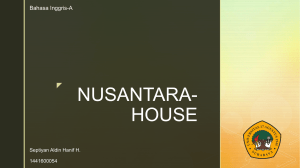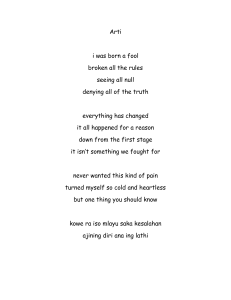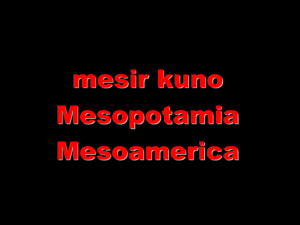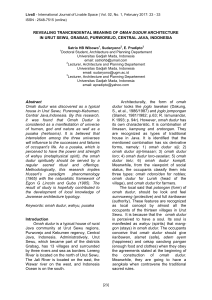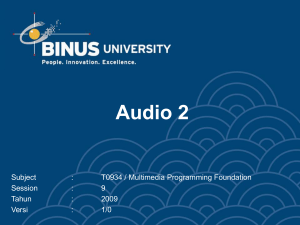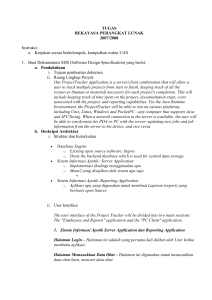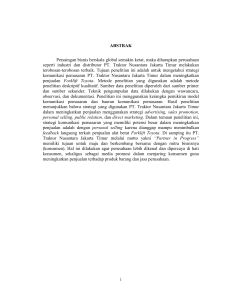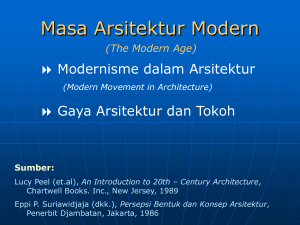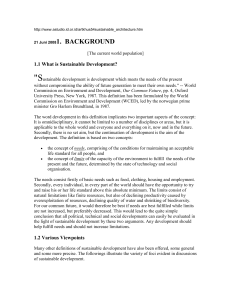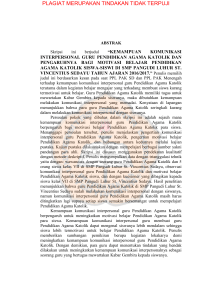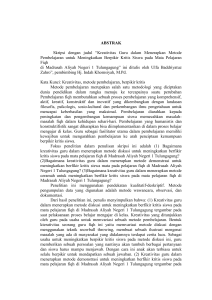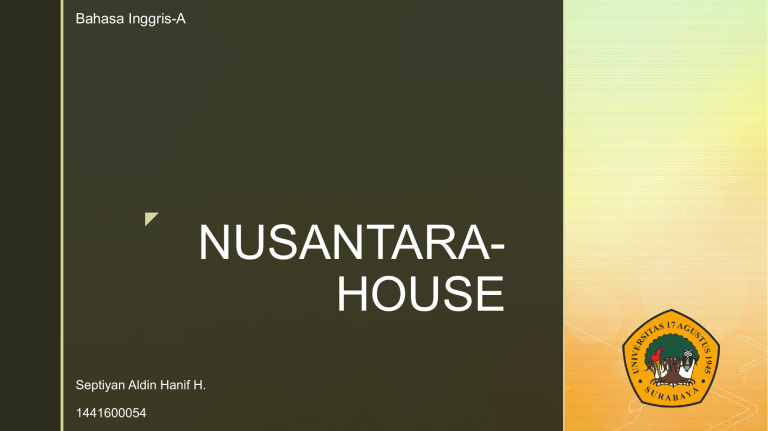
Bahasa Inggris-A z NUSANTARAHOUSE Septiyan Aldin Hanif H. 1441600054 z What is Nusantara House? Houses that only exist in Indonesia. The shapes and materials are very varied. The shape and material adapted to the surrounding natural conditions. These natural conditions result in various forms from the tip of Sabang to Merauke. The form of the archipelago house is very suitable for residents of the archipelago. The shapes and styles on each island differ according to function, custom, culture and belief. z Who triggered it? Prof. Dr. Ir. Josef Prijotomo, M.Arch who coined the name for the form of houses in Indonesia in <1800 to be “Arsitektur Nusantara”. In the year 1800 - 1945 named “Arsitektur Hindia”, after independence 1945 - Now named “Arsitektur Indonesia”, whereas from <1800 to the present it has been given a name “Arsitektur Mengkini”. z Sumatera NUSANTARA-HOUSE Sulawesi Kalimantan • Materials • Structure • Rooftop Jawa Nusa Tenggara Papua z What is Joglo House? Javanese traditional traditional house. Has a square base shape. Has a unique building structure. Knock down system Having various types of Joglo in each area spread across Java. Cost is very expensive, including maintenance. Only owned by the nobles or rich people of his day. z Design The basic design of house is “Rectangle”, and also the space form is rectangle too but in indoor space is also different meaning like Feng Shui. The Java House always had a Hirarchi. The shapes of rooftop has also different meaning and function. The meaning of rooftop is Symbol of Residents Status Social. More complicated and more carving or the ornament and the user had a higher social status, but more simply design or has not an ornament the user had a low social status. The function is same as like other Nusantara House, it is for thermal isolation. They know where they are live and they know what they need is. z Concept The concept of this house is Unforgettable God, it’s means they must respect what God is create to them so they build a house without nature where is important to respect them first. The basic philosophy of architecture is a mixture of Islamic religious influences that blend with Hinduism and Buddhism (animism) so that the philosophy of sikretism is very visible. z 1. Room details 2. Structure details 1. Foundation 2. Column 3. Sunduk Kili 4. Sawhorse 5. Connection Details z Room details First division called Pendopo usually used for public spaces like receiving guest or discussion. Second division called Gedongan usually used for private room like bedroom, family room, kitchen, etc. z Structure details Foundation The foundation of the Joglo house uses a foundation base or the Purus system. Made from concrete. Also pinned a continuous foundation to hold the wall forwarded to the ground (Ceblokan). Benefit Can minimize the effects of earthquakes Aesthetic value of the building Doesn’t damage the structure of the building Deficiency As a result of the earthquake will shift the foundation a few centimeters from its original position z Structure details Column Had 4 pieces Saka Guru for all size is 20x20 cm and length 3.5 meters Had 4 Emper Column for the size is 7x11 cm Had 5 Blandar Tumpang Sari include with Kendhit or Koloran by size is 15x15 cm For all that columns and size the materials used Kayu Jati. z Structure details Sunduk Kili (Meret or Kili) Is the horizontal block as a part of Saka Guru and Sunduk Kili, the size is 15x15 cm and the length is 3.6 meters. Materials that Sunduk Kili used is Teak Wood. d (sambungan sunduk) e (purus wedokan and kili) a (purus lanang saka guru) z Structure details Sawhorse using teak wood as the main material and has several parts, especially for rooftop, including : 1. Deep jurai 2. Sokong block 3. Gording 4. Rinse 5. Batten (covered by woven bamboo) Jurai dalam Balok sokong Usuk Gording Reng z Connection Consists of several connections to Joglo House, including : 1. Purus system connection 2. Cathokan system connection 3. Bibir berkait system connection Structure details z Conclusion The uniqueness of the joglo house is located on the roof, which consists of three stacks and each stack has different slopes, usually using rafters, battens or gording and without ceiling. If you use a ceiling it will follow the slope of the roof. The Joglo structure includes a foundation using a pedestal, in the middle of the room with four pillars. Soko guru shoulders the meret (sunduk kili) and also the construction of horses. the main material used to make the joglo roof horses is teak, the wood used can be decorated with carved or plain ornament.
